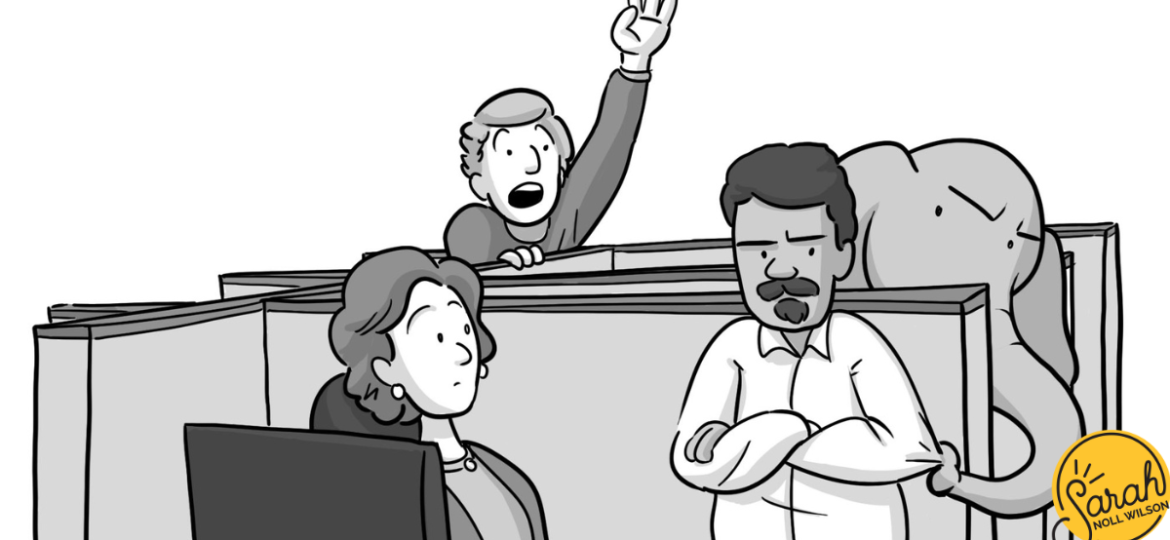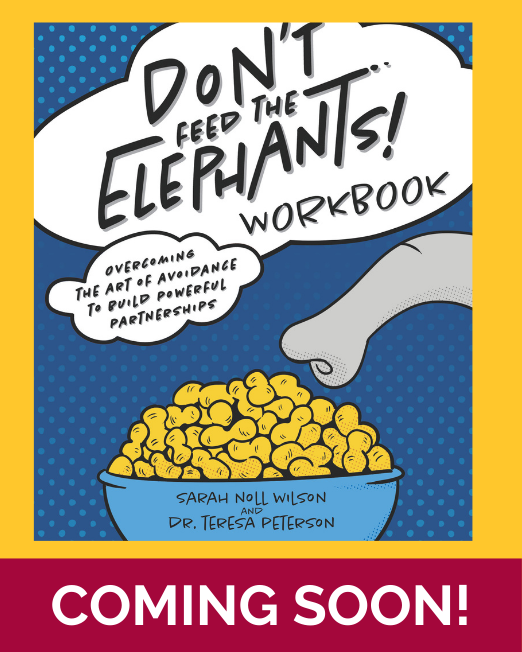
An excerpt from the forthcoming Don’t Feed the Elephants Workbook by Sarah Noll Wilson and Dr. Teresa Peterson

An elephant in the room is an unaddressed conflict. We feed the elephant when we recognize it but don’t address it.
The Elephant in the Room is not a person. The elephant is a conflict that creates a harmful barrier and goes unaddressed. If someone does something that causes an issue and there is a conversation, the conflict exists but isn’t an elephant. Elephants grow when we “feed” them with our avoidant behaviors and allow them to continue to linger as opposed to addressing them.
Psychological safety represents the ability to take risks without fear of retaliation.
One crucial element in addressing an elephant is psychological safety. A common misunderstanding is that psychological safety means comfort. But safety and comfort are not the same thing. Safety is the opposite of harm. In its most basic form, psychological safety means we can talk about things that might be challenging, we can ask questions, we can learn from each other, we can take risks, and we can disagree without fearing retaliation.
If you see avoidant behaviors, you might have an elephant in the room.
To spot avoidance in the world, you can be on the lookout for these classic behaviors:
- People become quiet, shift in their seats, fidget, or change the subject
- No one responds to questions or minimal responses are given
- Dialogue is sarcastic or passive-aggressive
- Body language changes—often arms are crossed, or people sit as far back as possible
- People become immersed in their phones—“urgent” calls must be taken, “urgent” emails must be replied to, unproductive messages are sent to others who are also in the meeting
If the energy has shifted suddenly, you might have an elephant in the room.
In addition to the behaviors listed, a palpable shift in the energy occurs. This shift can take the form of extremely low energy as people seek to withdraw from the conversation, or it can take an edgy, anxious kind of energy as people become increasingly uncomfortable. The most common words we hear to describe the feeling of having an elephant in the room are tense, anxious, and awkward.
It usually takes more work to avoid an elephant than to address it.
Tolerating elephants is incredibly costly. We routinely hear estimates that people spend twenty or more hours actively avoiding conversations. Recently, we had a conversation with a leader who described the cost of maintaining an elephant on a team within her organization. The team had grown from eight people to 22—not because the workload required it, but because the elephants had grown so large that they merely hired more people so the work could be done while the avoidance of one another and key issues continued.
Trust is key in not only freeing elephants, but in proactively preventing them.
It is human nature to judge ourselves by our good intentions and others by the impact they make. In terms of building trust with others, good intentions don’t take us very far. Ultimately, it is our behavior on a daily basis that others use to decide if we are trustworthy. You don’t get to decide if you’re trustworthy. Other people do.
Explore
- Think about a specific situation where there was an obvious issue or topic that everyone avoided discussing. What made it difficult to address?
- In your experience, how does the elephant in the room affect the dynamics of a conversation or relationship?
- What emotions arise for you when you’re aware of an elephant in the room? How do you typically respond?
- Reflect on a time when you chose to ignore an elephant in the room. What were the consequences of that choice?
Want More?
Think of the last time you knew there was “an elephant in the room.” When avoidance changed your experience of an interaction, leaving you feeling low, angry, guilty, uncomfortable, anxious—you name it.
What did you do?
Or, more to the point. . . what didn’t you do?
The Don’t Feed the Elephants! Workbook teaches us all how to show up for ourselves and others in these moments. As a companion to the 2022 bestseller Don’t Feed the Elephants! Overcoming the Art of Avoidance to Build Powerful Partnerships, this workbook offers actionable strategies and thought-provoking prompts to help you navigate the complexities of relationships, increase your self-awareness, explore possibilities, and take intentional action.
With candor, courage, and care, co-authors Sarah Noll Wilson and Dr. Teresa Peterson take us on a journey toward creating cultures of belonging while helping individuals, teams, and organizations overcome avoidance to create more meaningful connections and inspire growth.
If you’re a partner, a parent, a sibling, a leader, a team member, a volunteer, or anyone who wants to improve the quality of your conversations, this workbook is for you.



